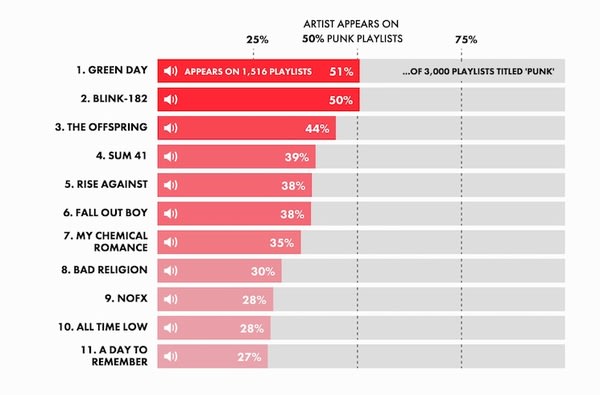"Punk" is one of those terms that's nearly impossible to define. Bad Religion-loving wakeboarders probably have a much different idea of the word than, say, the crusties who work at your local vegan co-op, the guys in Ian MacKaye beanies or the swoop-haired lip-ring kids who make metalcore drum tutorial vids in their bedrooms. Fortunately, a data analyst has now settled the debate once and for all. We now, apparently, have a definition for the word "punk."
Polygraph founder and data analyst Matt Daniels was commissioned by Converse (who, to prove just how punk they are, recently released their very own Sex Pistols line) to determine just exactly what punk is. He used data from YouTube and Spotify playlists to come up with a definitive punk list.
The results are sure to stir up conversation in your local Hot Topic line — it turns out that Green Day and Blink-182 are the most referenced bands on playlists that include the word "punk" in the title, appearing on 50 percent or more of the mixes. They're followed by the Offspring, Sum 41, Rise Against, Fall Out Boy, My Chemical Romance, Bad Religion, NOFX, All Time Low and A Day to Remember.
Oddly, bands like the Ramones are on less playlists than well-known punk groups like Panic! at the Disco, Yellowcard or Good Charlotte, and the Sex Pistols are even lower on the list. In fact, there are more "punk" playlists that feature songs by Papa Roach and Bowling for Soup than there are with Johnny Rotten and co.
Despite how much this might piss off "KBD OOP" Discogs dweebs and other punk traditionalists, Daniels argues that Blink-182 is ultimately an accurate representation of "punk" today. "I have a theory: in 2015, Blink-182 epitomizes punk culture, just as the Ramones, Sex Pistols, Black Flag, etc. did ten years ago," he writes. "For the masses, Blink-182 isn't just pop-punk – it's real punk."
Further, Daniels also scoured the web for punk subgenre, finding data about everything from skacore to "punk-pathetique" to Scottish-Gaelic punk. Magically, other artists that appeared on punk playlists included Three Days Grace, Rihanna, Aerosmith and even Coldplay. It turns out that everything ever recorded is probably considered punk by someone.
If you haven't punched a hole through your computer screen yet, you can dig into all of the data here.
Thanks to the punkers at Alternative Press for the tip.
Polygraph founder and data analyst Matt Daniels was commissioned by Converse (who, to prove just how punk they are, recently released their very own Sex Pistols line) to determine just exactly what punk is. He used data from YouTube and Spotify playlists to come up with a definitive punk list.
The results are sure to stir up conversation in your local Hot Topic line — it turns out that Green Day and Blink-182 are the most referenced bands on playlists that include the word "punk" in the title, appearing on 50 percent or more of the mixes. They're followed by the Offspring, Sum 41, Rise Against, Fall Out Boy, My Chemical Romance, Bad Religion, NOFX, All Time Low and A Day to Remember.
Oddly, bands like the Ramones are on less playlists than well-known punk groups like Panic! at the Disco, Yellowcard or Good Charlotte, and the Sex Pistols are even lower on the list. In fact, there are more "punk" playlists that feature songs by Papa Roach and Bowling for Soup than there are with Johnny Rotten and co.
Despite how much this might piss off "KBD OOP" Discogs dweebs and other punk traditionalists, Daniels argues that Blink-182 is ultimately an accurate representation of "punk" today. "I have a theory: in 2015, Blink-182 epitomizes punk culture, just as the Ramones, Sex Pistols, Black Flag, etc. did ten years ago," he writes. "For the masses, Blink-182 isn't just pop-punk – it's real punk."
Further, Daniels also scoured the web for punk subgenre, finding data about everything from skacore to "punk-pathetique" to Scottish-Gaelic punk. Magically, other artists that appeared on punk playlists included Three Days Grace, Rihanna, Aerosmith and even Coldplay. It turns out that everything ever recorded is probably considered punk by someone.
If you haven't punched a hole through your computer screen yet, you can dig into all of the data here.
Thanks to the punkers at Alternative Press for the tip.
